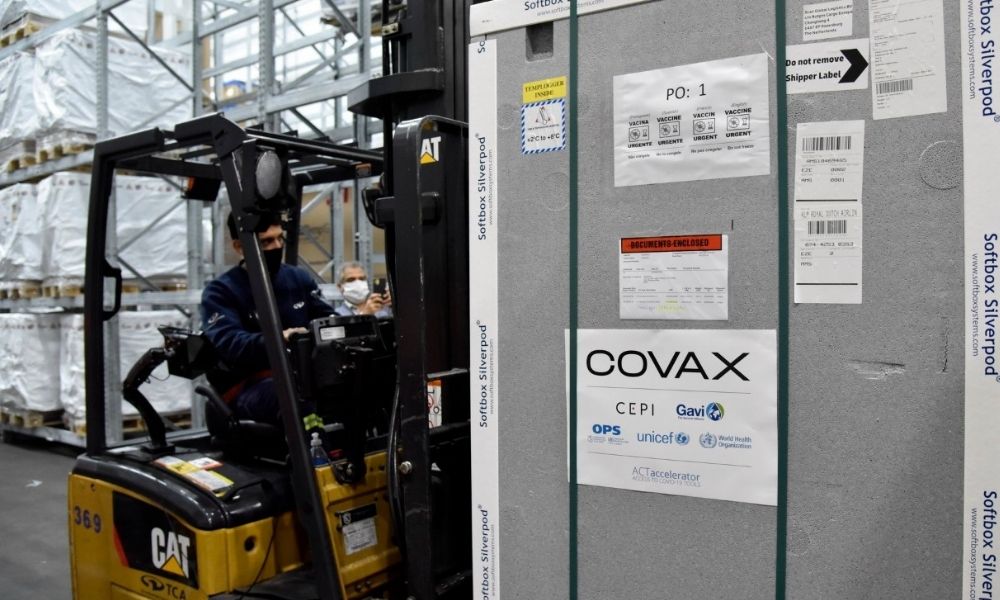
Credits: Wikimedia Commons
Rich Countries Can Afford To Donate COVAX Jabs While Fulfilling Their Goals: UNICEF
Writer: Devyani Madaik
A media enthusiast, Devyani believes in learning on the job and there is nothing off limits when it comes to work. Writing is her passion and she is always ready for a debate as well.
India, 17 May 2021 2:25 PM GMT
Editor : Shubhendu Deshmukh |
Shubhendu, the quint essential news junky, the man who loves science and politics in equal measure and offers the complete contrast to it by being a fan of urdu poetry as well.
Creatives : Devyani Madaik
A media enthusiast, Devyani believes in learning on the job and there is nothing off limits when it comes to work. Writing is her passion and she is always ready for a debate as well.
These countries could help fill the vaccine shortfall by sharing only 20 per cent of their three months' (June, July and August) stocks with the COVID-19 Vaccines Global Access (COVAX) scheme.
Countries belonging to G7 and European Union can afford to supply more than 150 million COVID-19 vaccines to lower-income countries without compromising their goals, the United Nations International Children's Emergency Fund (UNICEF) director Henrietta Fore said on Monday, May 17.
A study published by British firm Airfinity confirmed that these countries could help fill the vaccine shortfall by sharing only 20 per cent of their three months' (June, July and August) stocks with the COVID-19 Vaccines Global Access (COVAX) scheme.
The United Kingdom is due to host its fellow G7 member states, including Canada, France, Germany, Italy, Japan and the US, for a summit in June. By that time, the UN agency said, the COVAX programme will find itself 190 million doses short of what it had planned to distribute, reported NDTV.
"Sharing immediately available excess doses is a minimum, essential and emergency stop-gap measure, and it is needed right now," the media quoted the official statement.
According to the report, the US could share nearly 60 million AstraZeneca doses. France has pledged 5,00,000 doses, Sweden 1 million, with Switzerland considering a similar donation.
The COVAX scheme is co-led by Gavi, the Vaccine Alliance, and the World Health Organization (WHO) and Coalition for Epidemic Preparedness Innovations (CEPI).
Earlier in April, Gavi Vaccine Alliance had organised an event to boost support for the initiative and appealed for $2 billion by June for the programme, to buy around 1.8 billion doses this year.
So far, more than 38 million vaccine doses have been supplied to 111 countries in seven weeks under the scheme, most of them AstraZeneca's shot.
Shocking Gap
There is a wide gap between the developed and developing countries regarding the supply of COVID vaccines, with the former procuring enormous proportions, leaving the least for the low-income countries.
The developed countries have administered nearly 44 per cent of the 1.4 billion doses of COVID-19 vaccines. They account for 16 per cent of the global population. At the same time, only 0.3 per cent have been administered in the 29 low-income countries.
The World Health Organisation has also flagged this unequal distribution. Organisation Chief Tedros Adhanom Ghebreyesus last Friday asked the developed nations to refrain from giving jabs to children and adolescents and instead donate those doses to COVAX to meet the essential requirement.
The additional shortages have also come from the sudden flare-up of COVID cases in India. "We are concerned that the deadly spike in India is a precursor to what will happen if those warnings remain unheeded," the media quoted UNICEF.
Also Read: India At UNSC Meeting Calls For Immediate De-Escalation Of The Israeli-Palestinian Conflict
 All section
All section














